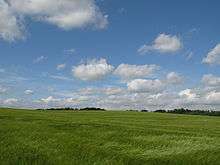Beowa
Beowa, Beaw, Bēow [beːow], Beo or Bedwig is a figure in Anglo-Saxon paganism associated with barley and agriculture. The figure is attested in the Anglo-Saxon royal genealogies as they were extended in the age of Alfred, where Beowa is inserted as the son of Scyld and the grandson of Sceafa, in lineages carried back to Adam.[1] Connections have been proposed between the figure of Beowa and the hero Beowulf of the poem of the same name and English folk song figure John Barleycorn.
Etymology
Beow is an Old English word for barley. In the Anglo-Saxon genealogies, Beowa is the son or grandson of Sceafa, the Old English word for sheaf. The noun beow has an Old Norse parallel in Bygg, the word for "grain." Related comparisons have been made between the figure of Beow and Byggvir, attested in the Prose Edda as a servant of the god Freyr.[2]
Theories
Some scholars posit a connection between the mythical figure of Beowa and the legendary Beowulf. As the two characters possess many of the same attributes, it has been suggested that "a god Beowa, whose existence in myth is certain, became confused or blended with Beowulf."[3] Another possibility is that the (first) scribe responsible for the text conflated them: at the beginning of the poem, there is a character called Beowulf (not the Beowulf of the title) who appears in the family tree of Scyld Scefing; this "Beowulf" is frequently changed to "Beow".[4] J. R. R. Tolkien, one of the proponents of reading "Beow" here, suggested that the two scribes who produced the Beowulf manuscript were "both extremely ignorant of and careless with proper names", and called the occurrence of "Beowulf" in this place in the manuscript "one of the reddest and highest red herrings that were ever dragged across a literary trail".[5]
Kathleen Herbert draws a link between Beowa and the figure of John Barleycorn of traditional English folksong. Herbert says that Beowa and Barleycorn are one and the same, noting that the folksong details the suffering, death, and resurrection of Barleycorn, yet also celebrates the "reviving effects of drinking his blood."[6]
See also
Notes
- ↑ Kathleen Herbert, Looking for the Lost Gods of England, 1994:15, noted by John Grigsby, Beowulf & Grendel2005:64.
- ↑ Alexander (2002:28).
- ↑ Lawrence (1909:249).
- ↑ "Ðā wæs on burgum Bēowulf Scyldinga", translated "Then it fell to Beow to keep the forts". (Heaney, Beowulf: a new verse translation, 2000:4/5).
- ↑ Tolkien, J.R.R. (2014). Beowulf: A Translation and Commentary. Houghton Mifflin Harcourt. p. 148. ISBN 9780544442795.
- ↑ Herbert (2007:16).
References
- Bruce, Alexander (2002). Scyld and Scef: Expanding the Analogies. Routledge.
- Herbert, Kathleen (1994, 2007). Looking for the Lost Gods of England. Anglo-Saxon Books. ISBN 1-898281-04-1
- Lawrence, William Witherle (1909). "Some Disputed Questions in Beowulf-Criticism" PMLA, Vol. 24, No. 2
